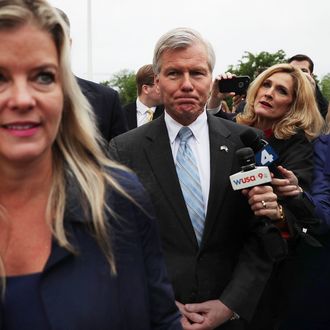
In a unanimous decision (the opinion was written by Chief Justice Roberts) at the very end of its current term, the U.S. Supreme Court held that the standard for determining official acts constituting corruption used in the federal trial of former Virginia governor Bob McDonnell was too broad. Thus, his conviction has been overturned.
In case you missed it, McDonnell and his wife were prosecuted and convicted for taking various gifts and cash (the latter mostly for costs associated with their daughter’s wedding) from the CEO of a diet supplement company who was pursuing some state business and the McDonnells’ personal backing. There was no real “smoking gun” — for example, some specific deal McDonnell cut or executive powers he exercised. But the trial judge said that wasn’t necessary. He instructed the McDonnell jury that “setting up a meeting, talking to another official, or organizing an event” did indeed constitute “official acts” for purposes of corruption statutes; since there was no real doubt he and his wife took money and things of value in exchange for doing these things, the standard made the conviction pretty certain.
But SCOTUS said it was the wrong standard. This is from Roberts’s opinion:
An “official act” is a decision or action on a “question, matter, cause, suit, proceeding or controversy.” That question or matter must involve a formal exercise of governmental power, and must also be something specific and focused that is “pending” or “may by law be brought” before a public official. To qualify as an “official act,” the public official must make a decision or take an action on that question or matter, or agree to do so. Setting up a meeting, talking to another official, or organizing an event—without more—does not fit that definition of “official act.”
Now that his conviction has been overturned, McDonnell is for the moment free (SCOTUS had earlier let him stay out of the hoosegow pending their decision), and federal prosecutors have to decide whether to retry him under the right standard or throw in the towel. Since his wife’s conviction proceeded under the same standard, she, too, should get the same relief. A few days into summer, it could be springtime for the McDonnells.
The implications for public corruption law are sobering. Corruption cases always involve proving a quid and a quo and a connection (the pro) between them. What McDonnell v. U.S. does is make the quo harder to establish. Basically acting as a go-between for a wealthy benefactor isn’t enough to constitute corruption. The guy who sought to corrupt the McDonnells didn’t get what he initially bargained for, and that lets the would-be corruptees off the hook. It hardly seems right from a commonsense point of view, but it is consistent with the general direction of the Court (notably in Citizens United) to excuse forms of influence peddling that do not descend into blatant and unmistakable exchange of cash for desired laws, regulations, or appointments. So life just got a little easier for both wealthy people and their political clients, who just need to take some care to be indirect about it all.






























